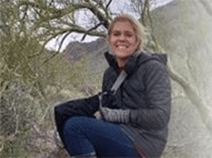The Path to UPMC
33-year-old Ashly Hunt is no stranger to brain surgery. When she was just 24 years old, Ashly suffered a brain hemorrhage while on vacation in Ocean City, Maryland, which destroyed a critical part of her brain that is responsible for the movement of the right side of the body.
The hemorrhage was caused by an underlying condition called a cavernous malformation, which is an abnormal, berry-like patch of blood vessels that can be found in the brain or spinal cord. Ashly’s cavernous malformation was located in her brainstem, one of the most dangerous brain regions on which to operate.
Schedule an Appointment or Ask a Question
Because of the complex nature of the situation and the extreme risk, Ashly’s nurse and family friend consulted with a neurosurgeon at Johns Hopkins University who recommended the chairman of neurological surgery at UPMC, as the person who should manage Ashly’s surgery. Using a special microscope and an image-guidance technology called High Definition Fiber Tracking, the doctor approached Ashly’s brainstem and was able to completely remove the cavernous malformation without damaging any part of her brain, marking the surgery a success.
As Ashly began to recover from surgery, she noticed daily improvements with her balance, speech, movements, and other functions that were affected by the hemorrhage. Once she recovered, Ashly created a beautiful watercolor and gave it to the doctor, who proudly displays it in his office to this day.
Ten Years Later: A Second Cavernous Malformation
In the years following her first brain surgery, Ashly attended an extensive rehabilitation program. Though mobility in the right side of her body is not back to 100 percent, she has been able to return to her professional life in the sale of commercial fabrics for use in architectural projects, as well as to her favorite hobbies – cooking and traveling. She currently lives and works in Baltimore.
In March 2020, nearly ten years since her initial brain surgery, Ashly suffered from new seizures and sought emergency care at her local hospital. After being treated in Baltimore, she once again turned to the doctor for his expertise. It turned out that Ashly’s seizures were the result of a second brain bleed caused by another cavernous malformation, this time in the right frontal lobe of her brain. If left untreated, the cavernous malformation could bleed again and result in serious deficits to the left side of Ashly’s body.
The Solution: An Awake Craniotomy
Ashly needed surgery to remove the cavernous malformation immediately. At the same time, growing concern surrounding COVID-19, the respiratory disease caused by the novel coronavirus SARS-CoV-2, made the prospect of brain surgery that much more time-sensitive. Fortunately, UPMC was prepared for this unique, unprecedented challenge.
The surgeon’s team scheduled Ashly’s pre-surgery MRI and bloodwork back-to-back with her surgery in order to limit her travel exposure to COVID-19. On March 19, just two weeks after her first seizure, Ashly underwent an awake craniotomy.
During an awake craniotomy, neurosurgeons use sophisticated brain mapping technology to locate motor and speech regions prior to tumor, or malformation, removal, so they can avoid damage to these sensitive areas during surgery. Because Ashly was awake during her surgery, the surgeon and his team could check in with her along the way to make sure they weren’t having a negative impact on her motor function as they removed the malformation.
“I felt calm the whole time,” Ashly says. “The surgeon's team even played music during the surgery. I was delighted to be well taken care of.”
The Results
The surgeon successfully removed the cavernous malformation from Ashly’s right frontal lobe without compromising the left side of her body. On March 20, a day after surgery, Ashly was released from the hospital and cleared to return home.
“Last time I had a brain bleed, I had to relearn simple tasks like talking, driving, and more. Imagine my surprise when I could leave after my second brain surgery one day after surgery walking on my own, feeling better, without seizures, and grabbing a coffee! Euphoric!” she says.
In the weeks following her surgery, Ashly has taken time to rest and recover. Following social distancing measures to safeguard against COVID-19, she had her follow-up appointment via a telemedicine visit on her smartphone. Ashly looks forward to getting back to her normal routine, and eagerly anticipates the time when it is safe to travel again.
"Through this difficult time, not only for me, but for the world, I’m grateful to the surgeon and his team for all that they’ve done for me," Ashly says.
Our patient stories profile a number of patients who have had minimally invasive brain surgery at UPMC. Although everyone's care experience is unique, we hope that sharing these stories will help other prospective patients and their families better understand these procedures and their potential benefits.
Ashly’s treatment and results may not be representative of all similar cases.

















